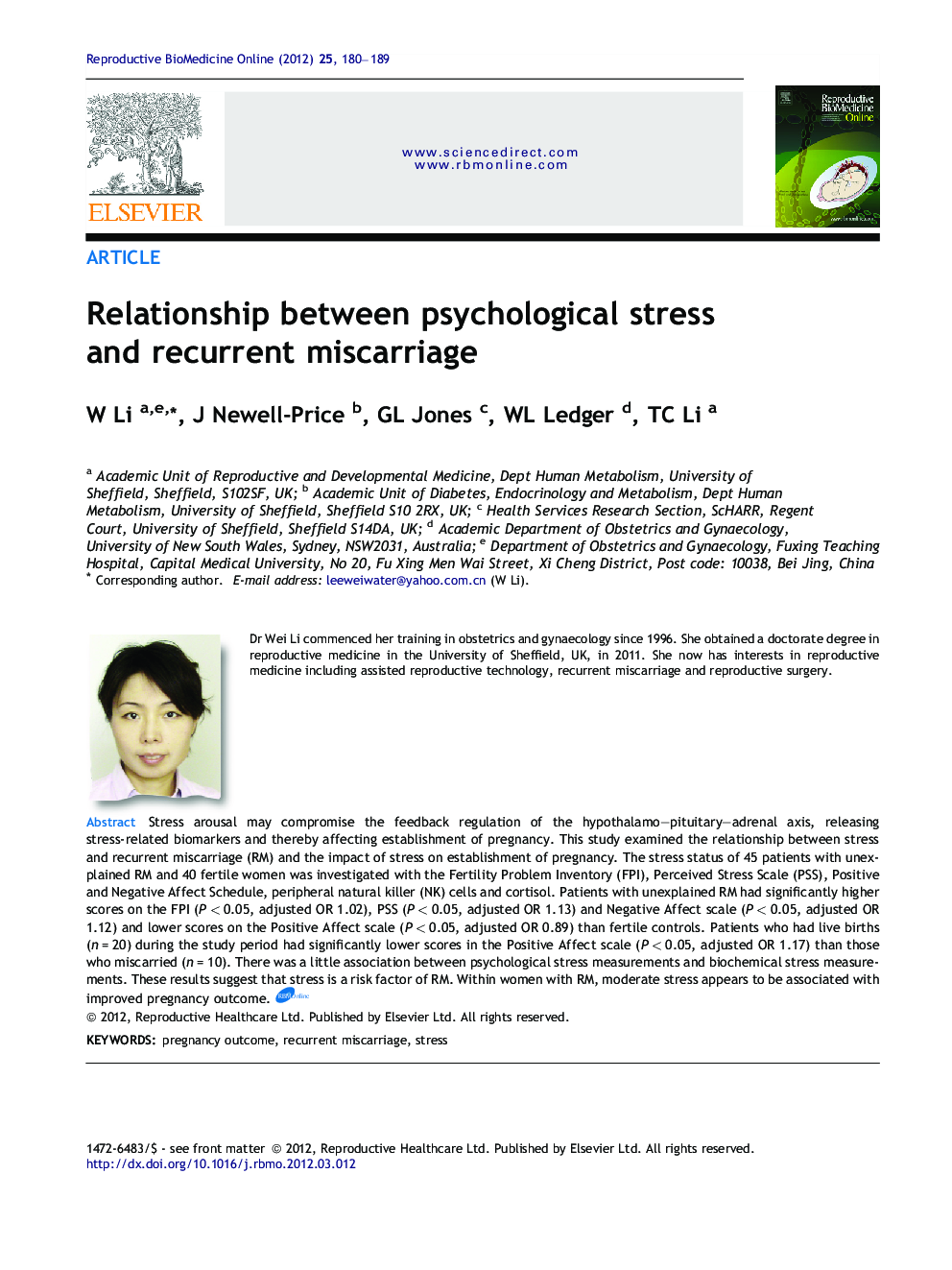| کد مقاله | کد نشریه | سال انتشار | مقاله انگلیسی | نسخه تمام متن |
|---|---|---|---|---|
| 3970457 | 1256725 | 2012 | 10 صفحه PDF | دانلود رایگان |

Stress arousal may compromise the feedback regulation of the hypothalamo–pituitary–adrenal axis, releasing stress-related biomarkers and thereby affecting establishment of pregnancy. This study examined the relationship between stress and recurrent miscarriage (RM) and the impact of stress on establishment of pregnancy. The stress status of 45 patients with unexplained RM and 40 fertile women was investigated with the Fertility Problem Inventory (FPI), Perceived Stress Scale (PSS), Positive and Negative Affect Schedule, peripheral natural killer (NK) cells and cortisol. Patients with unexplained RM had significantly higher scores on the FPI (P < 0.05, adjusted OR 1.02), PSS (P < 0.05, adjusted OR 1.13) and Negative Affect scale (P < 0.05, adjusted OR 1.12) and lower scores on the Positive Affect scale (P < 0.05, adjusted OR 0.89) than fertile controls. Patients who had live births (n = 20) during the study period had significantly lower scores in the Positive Affect scale (P < 0.05, adjusted OR 1.17) than those who miscarried (n = 10). There was a little association between psychological stress measurements and biochemical stress measurements. These results suggest that stress is a risk factor of RM. Within women with RM, moderate stress appears to be associated with improved pregnancy outcome.The aim of this study was to examine the relationship between stress and recurrent miscarriage (RM) and the impact of stress on the establishment of a pregnancy. The stress status of 45 patients with unexplained RM and 40 fertile women was investigated with the Fertility Problem Inventory (FPI), Perceived Stress Scale (PSS), Positive and Negative Affect Schedule (PANAS) and biochemical stress measurements including peripheral natural killer (NK) cells and cortisol. Patients with unexplained RM had significantly higher scores as measured on the FPI (P < 0.05, adjusted OR 1.02), PSS (P < 0.05, adjusted OR 1.13), Negative Affect scale (P < 0.05, adjusted OR 1.12) and lower scores on the Positive Affect scale (P < 0.05, adjusted OR 0.89) than fertile controls after estimated ORs were adjusted for age and numbers of previous miscarriages. Patients who had live births (n = 20) during the study period had significantly lower scores as measured on the Positive Affect scale (P < 0.05, adjusted OR 1.17) than those who miscarried (n = 10) after adjustment had been made for age and numbers of previous miscarriages, suggesting that these patients had elevated levels of depression. There was an association between psychological stress measurements and biochemical stress measurements where the number of peripheral CDbright NK cells was inversely correlated with the scores of the FPI and serum cortisol concentrations (P < 0.05). These results suggest that stress is a risk factor of RM and, within women with RM, stress appears to be associated with an improved pregnancy outcome.
Journal: Reproductive BioMedicine Online - Volume 25, Issue 2, August 2012, Pages 180–189